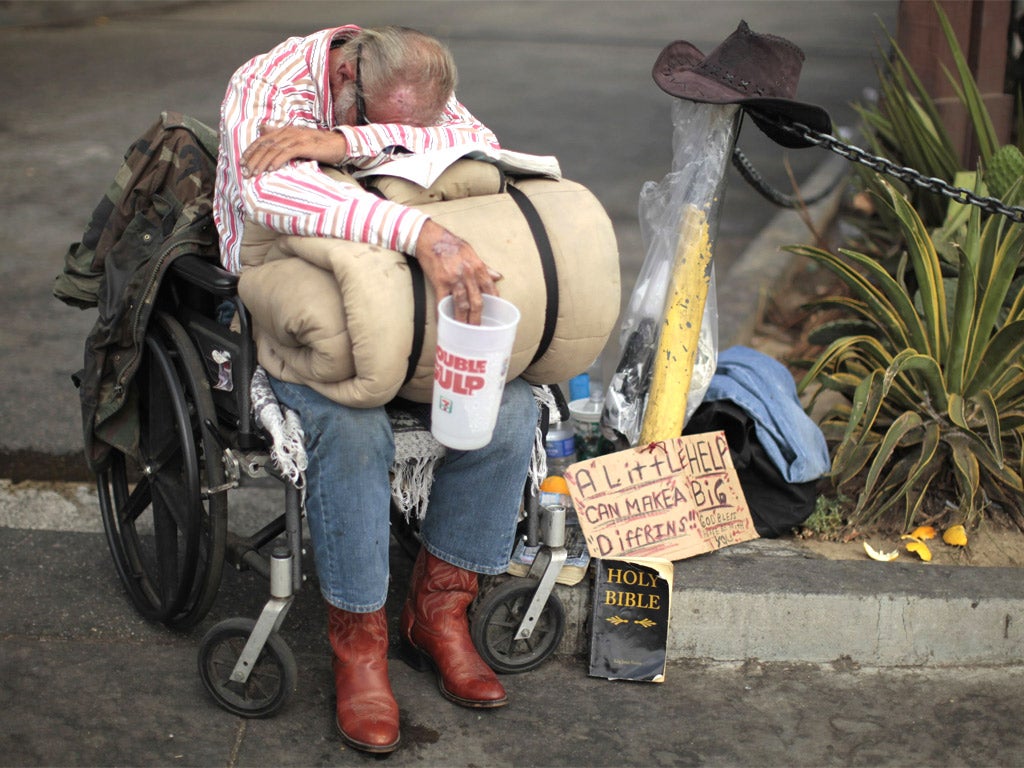California, the ninth largest economy in the world, resorts to austerity
California, America's 'golden state', is slashing spending to avoid a Greek-style default

Taking a deep breath, California's most powerful man strode to a lectern and unveiled the fiscal policy that he hopes will keep America's most populous state from falling into bankruptcy.
"You name it," he declared, "and we've got to cut it!"
It wasn't the most nuanced announcement. But this is no time for subtlety. After years watching his state fall deeper and deeper into the red, Governor Jerry Brown used a gloomy Monday night press conference to unveil what aides described as the ultimate in austerity budgets.
Welfare payments, healthcare for the poor, and benefits for elderly and disabled Californians will be immediately slashed by around $8.3bn (£5.2bn), which equates to roughly 17 per cent of Mr Brown's entire discretionary budget. And state offices, which employ roughly 200,000 people, will switch to a four-day, 38-hour work week.
The radical proposals came days after it emerged that the Golden State, which is currently suffering 11 per cent unemployment, has a projected annual deficit of $16bn, far higher than the $9bn predicted in January. Its total debt is now around $40bn, giving it the lowest credit rating of any US state in recent history and prompting fears of a Greek-style default crisis.
Things may get worse before they get better. If voters fail to approve a series of temporary tax rises at November's election, Mr Brown said a further $6bn of cuts will immediately be triggered, mostly targeting California's education system and reducing the school year by three weeks.
That proposed move, described as apocalyptic by Mr Brown's fellow Democrats, would also eliminate such iconic public services as the lifeguards who have historically presided over the state's sun-kissed beaches.
"I'm linking these serious budget reductions with a plea to voters: please increase taxes temporarily," Mr Brown told reporters in the state capital of Sacramento.
The drastic cuts underline California's position at the sharp end of a debt crisis which is slowly engulfing local and state-wide public finances across America. Stockton, an hour's drive north-east of San Francisco, recently became the biggest city in the nation to declare bankruptcy.
For years, California, like many public bodies, has been spending more than it can raise in taxes, and borrowing to make up the difference. The process was exacerbated by the 2008 housing crash, which decimated property prices and reduced income tax revenue.
This year, even with Mr Brown's latest round of cuts, the state will spend roughly $91bn but only raise $83bn. If allowed to continue, it could find itself unable even to service existing debts in a matter of months. "California has been living beyond its means," Mr Brown said. "The USA and its federal government is living beyond its means. Well, there has to be a balance and a day of reckoning."
Fixing the crisis has eluded successive governors, including Mr Brown's predecessor Arnold Schwarzenegger. Tax rises have for years been blocked by Republicans in the state Senate, who are able to exploit a law mandating that all increases in revenue must gain the approval of 60 per cent of legislators.
Most spending cuts are blocked by Democrats, who hold a slim majority of seats there.
With this in mind, Mr Brown, a veteran politician who served two terms as governor in the 1970s, has decided to bypass Sacramento altogether. He will instead ask voters, rather than politicians, to approve a package of specific tax increases in a ballot measure at November's election.
That proposal will see sales taxes hiked to 7.5 per cent, from 7.25 per cent. Residents earning over $250,000 a year will endure a 3 per cent rise in income taxes. People who earn more than $1m will pay 13.3 per cent, in addition to their federal taxes.
The world's wealth: 10 richest by GDP
(in millions of US dollars)
1. United States $14,620,000
2. China $5,879,100
3. Japan $5,391,000
4. Germany $3,306,000
5. France $2,555,000
6. Brazil $2,518,000
7. United Kingdom $2,259,000
8. Italy $2,037,000
9. California $1,911,822
10. Canada $1,564,000
Source: CIA World Factbook
Subscribe to Independent Premium to bookmark this article
Want to bookmark your favourite articles and stories to read or reference later? Start your Independent Premium subscription today.

Join our commenting forum
Join thought-provoking conversations, follow other Independent readers and see their replies